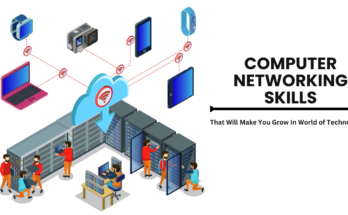Types of Computer Networking Jobs that enhance your future:
What Is a Computer Network?
A computer network is a technological system that facilitates electronic data communication between two or more computers or other electronic devices. Local area networks (LANs) and wide area networks (WANs) are the two most used forms of computer networks. Wi-Fi and Ethernet cables are two examples of the various connection types used by computer networks.
What Is Computer Networking?
The study of computer networking is centered on the technological processes involved in computer networks. This might involve computer network applications and development, maintenance and repairs, tracking and evaluating any issues, and coming up with plans to avoid or resolve them.

Career Paths You Can Achieve in Computer Networking
A degree in computer networking provides thorough instruction in all facets of network technology, including setups, maintenance, upgrades, theoretical ideas, design principles, and real-world applications. Bachelor’s degree holders in computer networking jobs paths in the industry are well-positioned to take advantage of a variety, such as system implementation, network architecture design, problem solving, and troubleshooting.
1. Computer Network Architects
From modest office networks to enormous facilities, Computer Networking Jobs architects design and construct computer networks. They develop techniques, submit them to management, and sometimes even upgrade technology connected to networks. Although a master’s program in business administration with a premium on information systems is preferred by certain employers, a bachelor’s degree in a computer-related discipline is required.
-
A cloud architect
has to be well-versed in cloud computing designs, ideas, and service models. They also need to be proficient with cloud platforms like Google Cloud Platform (GCP), Microsoft Azure, and Amazon Web Services (AWS). Furthermore, expertise in fields like as automation, virtualization, and containerization is highly valued.
2. Network and Computer Systems Administrators
Organizations using network technology can get technical assistance from network and computer systems administrators. They manage the organization’s server infrastructure, making sure everything is safe and operational. Additionally, they is capable of handling adding new users while offering them with network training in addition to installing, maintaining, and upgrading networks. A bachelor’s degree in computer science is a necessity for these individuals; certain employers may accept an associate degree.

3. Computer and Information Systems Managers
Managers of computers and information systems and these Computer Networking Jobs, often known as project managers or information technology (IT) managers, assist businesses with determining their IT objectives and utilizing technology for computers to carry them out. These professionals may be categorized into several sorts of managers based on the demands and size of the firm.
- Chief information officers, chief technological officers, IT directors, and IT security managers are some of these job positions; while each manager has a different set of responsibilities, they all strive toward the same objective.
- this vocation, a bachelor’s degree in computer science or a similar discipline is the minimal prerequisite. A large number of these managers has years of relevant job experience in addition to a Master of Business Administration.
Computer Networking Jobs: Experience Level Breakdown
| Experience Level | Annual Salary Range | Job Postings | Certificates Available |
|---|---|---|---|
| Beginner | $49,560 – $80,600 | 21,160 | 5 |
| Intermediate | $62,970 – $102,720 | 48,110 | 11 |
| Advanced | $80,600 – $130,830 | 26,010 | 8 |
4. Computer Systems Analysts
Similar to information and computer systems managers, computer systems analysts work for organizations to enhance their systems. In this Computer Networking Jobs manager supervise the work of systems analysts, whilst the former interact directly with computer systems. Computer systems analysts provide managers with advice, provide effective approaches, and come up with ideas for changing current systems. Furthermore,
- They teach users of the wrapped up versions of the systems and carry out testing on the systems. One way to do this is to write instruction manuals.
- Although it’s not generally necessary, many computer systems analysts hold bachelor’s degrees in computer-related fields.
- A few of them have done research on their own to refine their talents.
- Programs for training IT systems analysts are an alternative choice.
- Sometimes suggested is a master’s degree in computer science or business administration.
5. Computer Repair Technician
Professionals in computer repair are essential in identifying and fixing problems with computers and their parts. They have become adept in resolving network server difficulties as well as diagnosing both software and hardware issues. Computer repair specialists are furnished with the knowledge and abilities to maintain systems operating properly, whether they are fixing software bugs and viruses or fixing damaged hardware components like motherboards, CPUs, or hard drives.

Specialists in this field could be able to work in a variety of environments, such as inside positions in big enterprises where they help staff technically, or as part of independent customer-focused computer repair businesses. Computer repair professionals are essential to the smooth running of organizations because they guarantee the effectiveness and usefulness of computer systems in every situation.
6. Cybersecurity Specialist
Cybersecurity experts are crucial in protecting sensitive data and digital assets of organizations from online threats and invasions. To guard against any breaches, they create and execute security measures, carry out risk analyses, and handle security events.
Cybersecurity experts are more required than ever in a time when cyberattacks are increasing more complicated and common. Organizations in different industries, from government agencies to financial institutions, depend on these specialists to bolster their security measures and reduce potential threats.
7. Wireless Communication Engineer
To serve a variety of devices and applications, communication over wireless networks engineers develop, deploy, and optimize wireless networks. To guarantee dependable and effective wireless communication, they assess network performance, antenna design, and radio propagation.
Beginning employees jobs in wireless communication engineering demand a bachelor’s degree in electrical engineering, telecommunications, or a related field of study. Specialized training in signal processing, RF engineering, and wireless networking might offer essential knowledge and abilities for this position.
Conclusion:
There are many diverse roles, including network administrators, engineers, security specialists, wireless specialists, cloud network architects, and support specialists. Strong understanding of networking concepts, problem-solving, communication, and the ability to learn and adapt are key. Average salary depends on experience level, location, industry, and specific role. The table in your previous request provides a general range. Professional organizations like CompTIA and Cisco offer certifications and resources. Industry publications, online courses, and networking events can also be beneficial.
FAQs about Computer Networking Jobs:
What are the type of computer networking jobs?
There are many diverse roles, including network administrators, engineers, security specialists, wireless specialists, cloud network architects, and support specialists.
Computer networking jobs outlook?
The outlook is generally positive, with projections of strong growth due to increasing technology dependence and emerging trends like 5G and IoT.
What skills do I need to succeed in Computer Networking Jobs?
Strong understanding of networking concepts, problem-solving, communication, and the ability to learn and adapt are key.
What are the certifications valuable for Computer Networking Jobs?
Various industry-recognized certifications exist, with the number increasing at each experience level. Research specific roles and employers for specific requirements.
For mid-level positions what skills and experience are needed?
Experience in specific areas like network administration, security, or wireless technologies is often required, along with relevant certifications.
Average salary for different Computer Networking Jobs?
This depends on experience level, location, industry, and specific role. The table in your previous request provides a general range.
Where can I find job openings for networking positions?
Online job boards, company websites, and professional networking platforms are valuable resources.
Do I need a college degree to work in computer networking?
While not always required, a related degree can be helpful, especially for advanced roles. Certifications and experience can also be valuable pathways.
What resources can help me learn more about these careers?
Professional organizations like CompTIA and Cisco offer certifications and resources. Industry publications, online courses, and networking events can also be beneficial.
Mastering Tech Networking: Strategies and Insights for Success



